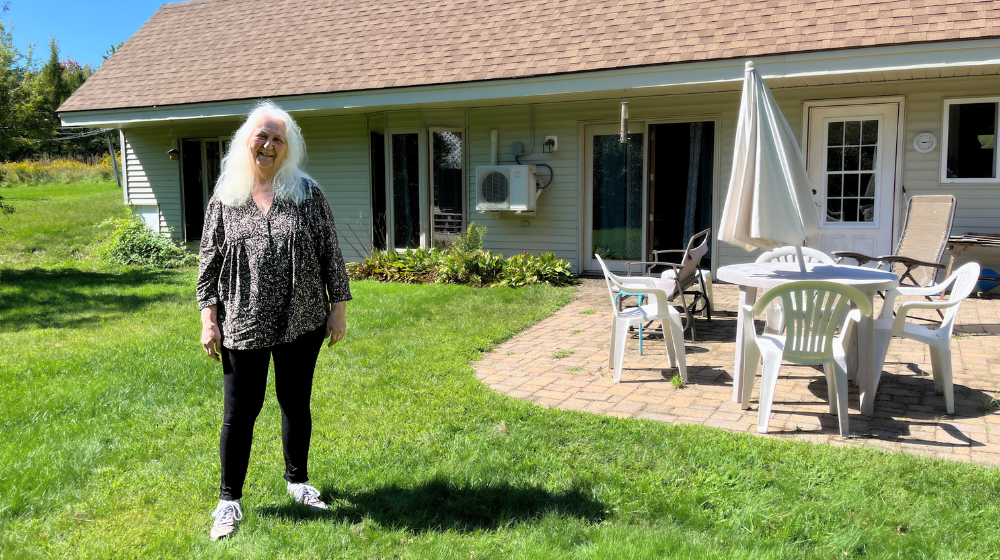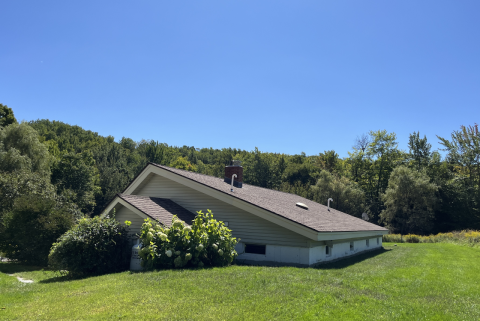
After a dozen years in her Franklin County home, lifelong Mainer Lucille thought she knew what to expect during bad weather. Therefore, when torrential rains struck Western Maine on June 29, 2023, she wasn’t particularly alarmed at first. Her home is located partway up a hill and not near any significant water source. But the rain sheeted down at up to two inches per hour, and suddenly the water started rising toward her house, something she’d never seen happen before.

Lucille’s home is an earth-berm style structure, set into the hillside for maximum energy efficiency, which meant her front door faced the rising waters. Soon there was “a lake” of water around the house, and water and mud began seeping in, ultimately reaching nearly a foot deep. Emergency responders eventually made it to her place, but they reported that the roads in every direction were washed out. There was no easy exit route, so she and her cat, Tabby, stayed put.
The source of the water flooding Lucille’s place was a small stream more than 100 feet away down a slope. Stranded on site, she was there when the water finally started receding. She opened the sliding doors at the front of the house and watched water pour out. As the water drained away, Lucille was left with mud and standing water in every room. Her personal items were soaked and muddy, and some things had even floated away.
As a retiree on a limited budget, the damage and destruction were beyond daunting. It was a week before the roads were cleared and repaired enough even to allow basic travel in her area. Meanwhile Lucille and Tabby navigated through the mess at home, using piled newspapers to create walkways. She aired out the house and tried to remove as much water and debris as possible, but was slowed by physical limitations.
Early on, one of Lucille’s friends as well as an acquaintance who worked in the community volunteered to come help her clean up. They both worked long hours cleaning out the mud and hauling out the ruined furniture and other personal items. Others lent a hand as well. This community spirit is one of the things that Lucille loves about the rural town where she lives. “It feels like home,” she says. “It’s the kind of place where people volunteer to come clean your entire house and don’t take any credit for it. That’s what people are like here.”
However much her neighbors helped with the cleanup, the fact remained that her home needed expensive repairs following the flood. With her fixed retirement income, Lucille didn’t have enough savings on hand to cover the costs like replacing the heating system and the flooring. She learned that her homeowner’s insurance excluded flood damage. She started calling local and state offices to find out what resources were available. “Everyone was very helpful and kind,” she says. “But they just couldn’t do anything because there was no funding.”
Fortunately, someone at the FEMA office in Farmington told Lucille about a program offered by USDA Rural Development. She learned that Rural Development offers Single Family Housing Disaster Repair Loans and Grants. The program, also called the “504 Disaster Pilot,” had been launched in the summer of 2023 to help homeowners repair damages caused by a Presidentially Declared Disaster. The flooding in Franklin County in June of 2023 had been declared a disaster by President Biden at the request of Maine Gov. Janet Mills, and Lucille met the other requirements to participate in the program.
With the help of Loan Specialist Aaron Beaulieu in Rural Development’s Lewiston office, she was able to secure a $6000 grant to replace the ruined, buckled floors in her home. The modest grant meant that she could have the damaged areas torn out and replaced. Installing completely dry, smooth flooring helped restore the air quality and safety of the home.

In reflecting on her grant process, Lucille notes that the State of Maine has a large population of seniors with fixed incomes. “In order to stay in our homes, we may need financial assistance.” When funding is available, Rural Development’s Disaster Repair Loans and Grants can provide this assistance, helping people stay in their own homes and restoring them to good repair following disasters.
More than a year after the flood inundated her yard and house, Lucille has made significant progress in restoring her home. The flooring replacement is complete. With support from Western Maine Community Action, new radiators were installed to replace the former underfloor radiant heat. (She credits local companies Northland Custom Flooring, Kitchen, & Bath and Fitch Plumbing for making the major projects more bearable with their good service.) She still misses the furniture and other possessions that were ruined by the muddy water and plans to keep replacing items as she is able.
“A flood causes a lot of physical damage and an extreme amount of emotional damage,” Lucille says. “When a disaster strikes, to know there is help available when you’re not a millionaire is a wonderful thing. I’m very grateful.”

